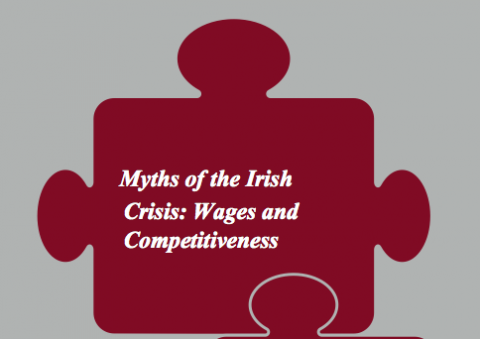Irish labour costs are not too high - TASC

Think-tank TASC has released a report by economist Tom McDonnell which seeks to address two claims: first, that Ireland's competitiveness has declined in the past decade; and second, that high labour costs in low-wage sectors are contributing to the employment crisis. The paper, published on April 14, concludes that neither argument is supported by available data. In a statement published on the TASC website, its director, Nat O'Connor, said:
"If we look at the evidence being published by TASC today, it is clear that Ireland has not suffered a loss of competitiveness relative to the rest of the European Union.
"In addition, Irish low-paid workers cost their employers less than many of their European counterparts. Countries such as Denmark, Sweden and Finland have successfully weathered the economic crisis, while maintaining much higher hourly labour costs in the low-wage sectors than the levels in Ireland.
"The short-sighted focus on cutting wages obscures the need to tackle the immediate problems in the Irish economy. In particular, low demand will merely be exacerbated by cutting wages further.
"We need to maintain and boost our competitiveness and we need to grow jobs. Neither of those aims will be achieved by cutting wages, reducing demand and increasing inequality. Rather, what we need are banks that lend, investment for the short-term in job-rich activities such as home insulation, and investment for the long-term in education and R&D to drive innovation.
"Above all, economic recovery requires policies based on evidence rather than on assumptions that have been shown to be seriously flawed."
The Coalition to Protect the Lowest Paid welcomed the publication of the paper in light of the proposed governmet review of the minimum wages and conditions set by Joint Labour Committees for many of the lowest-paid workers in the country. Said Siobhán O'Donoghue, director of the Migrant Rights Centre Ireland: "Cutting the minimum wages and conditions of the lowest paid workers set by Joint Labour Committees agreements is not the answer to help to create jobs. It would take even more money out of the economy and force working families already struggling to make ends meet into greater poverty and hardship. Any changes made to JLCs should in no way reduce the incomes of the lowest paid."
Highlights from the paper are below, and the full document is available for download here.
- It has repeatedly been asserted in the media and by lobby groups that Ireland became uncompetitive during the boom and that labour market inefficiencies contributed to this loss of competitiveness. However Ireland outperformed the OECD in terms of volume growth of exports during the boom, which implies no loss of competitiveness. Although Ireland's ranking in the global competitiveness index has deteriorated in recent years, the World Economic Forum does not attribute this to labour market inefficiencies. A small market size; poor infrastructure; macroeconomic instability and dysfunctional financial markets are identified as the factors inhibiting competitiveness.
- It has also been asserted that high labour costs are a contributory factor in Ireland's high unemployment rate. Eurostat data reveals that labour costs in the hospitality sector and wholesale/retail sector lag behind EU-15 averages in nominal terms and in terms of purchasing power parity.
- One narrative used to explain the crisis is that the economic and employment crisis in the Euro periphery (Ireland, Greece, Portugal, and Spain) has been partly caused by a loss of competitiveness in these countries. Those endorsing the competitiveness narrative as a cause of the ongoing crisis argue that labour market adjustments (wage reductions) in the periphery are required. This is because the normal recourse of currency devaluation is not available as an option for members of the euro area. However, it is not clear that competitiveness is the central issue. As Gros (2011) has recently argued, the 'market share' of EU-27 exports has essentially remained unchanged over the last decade for each of the four peripherals. If export performance is an indicator of competitiveness, then the data does not support the loss of competitiveness argument.
- According to the Global Competitiveness Index published annually by the World Economic Forum (2010), Ireland marginally improved its competitiveness ranking from 30th position in 2002 to 29th in 2010. Small market size (54th), poor infrastructure (35th) and macroeconomic instability (95th) were identified as factors inhibiting competitiveness. Although Ireland's ranking has declined since the middle of the last decade, the World Economic Forum primarily attributes this to the weakening macroeconomic environment as well as to continuing concerns related to financial markets (ranked 98th).
- Labour costs were not identified as inhibiting Ireland's competitiveness by the World Economic Forum (WEF) in its 2010 report. Ireland is identified as having a well functioning labour market (ranked 20th).
- Labour costs in the retail and hospitality sectors are lower than equivalent labour costs in the EU-15. Consequently the evidence does not support the argument that labour costs are driving high unemployment in these particular sectors. However this does not imply that no scope exists for measures to improve competitiveness. Ireland is a high cost location for many utilities including broadband (OECD, 2010), waste (Forfás, 2010) and electricity costs for SMEs. Other examples of high costs include those for professional services and office rental costs. In addition, the EU/IMF Memorandum of Understanding (Merrion Street, 2010) contains certain competitiveness enhancing measures which are welcome. There is a strong argument supporting the provision for legislation in the second quarter of 2011 removing restrictions to trade in the sheltered sectors (legal profession, pharmacists, doctors, dentists, accountants). Despite the downturn, legal service costs at the end of 2009 were over 18 per cent above their 2006 level (Forfás, 2010). Removing these restrictions should exert downward pressure on wages in these high-pay sectors.
